|
|
|
Sort Order |
|
|
|
Items / Page
|
|
|
|
|
|
|
| Srl | Item |
| 1 |
ID:
144384
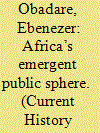

|
|
|
|
|
| Summary/Abstract |
[There] appears to be a generally more assertive public sphere, with an ebullience strikingly in excess of the technological resources at its disposal.” Seventh in a series on public spheres around the world.
|
|
|
|
|
|
|
|
|
|
|
|
|
|
|
|
| 2 |
ID:
179282
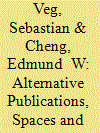

|
|
|
|
|
| Summary/Abstract |
Reviewing the extant literature on China's public sphere from the perspective of 20th-century history and social science, this introductory essay argues for the continued relevance of studying the publications and public practices associated with knowledge communities. By steering away from normative definitions and by envisaging publicness as a process, a connection can be explored between social discourses and political practices in China. Discursive communities, based on shared identity or sociability, may appear marginal, but at key moments they can play a unique role in modifying the dynamics of political events.
|
|
|
|
|
|
|
|
|
|
|
|
|
|
|
|
| 3 |
ID:
160551


|
|
|
|
|
| Summary/Abstract |
Although anonymity is a central feature of liberal democracies—not only in the secret ballot, but also in campaign funding, publishing political texts, masked protests, and graffiti—it has so far not been conceptually grounded in democratic theory. Rather, it is treated as a self-explanatory concept related to privacy. To overcome this omission, this article develops a complex understanding of anonymity in the context of democratic theory. Drawing upon the diverse literature on anonymity in political participation, it explains anonymity as a highly context-dependent identity performance expressing private sentiments in the public sphere. The contradictory character of its core elements—identity negation and identity creation—results in three sets of contradictory freedoms. Anonymity affords (a) inclusion and exclusion, (b) subversion and submission, and (c) honesty and deception. This contradictory character of anonymity's affordances illustrates the ambiguous role of anonymity in democracy.
|
|
|
|
|
|
|
|
|
|
|
|
|
|
|
|
| 4 |
ID:
173866
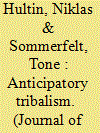

|
|
|
|
|
| Summary/Abstract |
This article examines the upsurge in denunciations of ‘tribalism’ in public debate during The Gambia's transition from the autocracy of Yahya Jammeh to the ‘New Gambia’ under President Adama Barrow. In these public debates, derogatory statements about particular ethnicities articulate fears of present or future alliances to monopolise political power. These fears are disproportionate to attempts of organised political mobilisation on ethnic grounds, which remain marginal. It is argued that accusatory politics are a salient, and neglected, feature of ethnic dynamics in contemporary Gambian – and African – politics. This politics of accusation involves the contestation and negotiation of moral legitimacy in the political sphere, in a manner challenging the separation of the moral and the political undergirding scholarly distinctions between ethnicity and tribalism.
|
|
|
|
|
|
|
|
|
|
|
|
|
|
|
|
| 5 |
ID:
109155
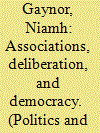

|
|
|
|
|
| Publication |
2011.
|
| Summary/Abstract |
Over the past two decades there has been a burgeoning interest and research into experiments and innovations in participatory governance. While advocates highlight the merits of such new governance arrangements in moving beyond traditional interest group representations and deepening democracy through deliberation with a broad range of civic associations, critics express concern about the political legitimacy and democratic accountability of participating associations, highlighting in particular the dangers of co-option and faction. Addressing these concerns, a number of theorists identify an important role for civic associations in linking deliberations at micro policy levels to those within the public sphere more broadly. These normative contributions raise an important empirical question-does civic associational engagement at micro levels leave scope to engage both laterally across associations and vertically with members and citizens more broadly? More simply put, is civic associational engagement within micro-policy fora "good" for democracy more broadly? Drawing from a study of civic associational engagement in Ireland's national Social Partnership process over a ten-year period this article argues that, where deliberations become overshadowed by more traditional communicative norms of bargaining and negotiation, it is not. Evidence is presented from the Irish case to show how civic actors, having internalized the dominant communicative norms of the process, have contributed toward a narrowing of the deliberative space within, but most particularly outside, this process. This, it is argued, has resulted in a considerably weakened public sphere with neither the institutional apparatus nor the discursive capacity to seek accountability from political and civic leaders at a time of profound crisis within the Irish state.
|
|
|
|
|
|
|
|
|
|
|
|
|
|
|
|
| 6 |
ID:
174031
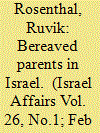

|
|
|
|
|
| Summary/Abstract |
This article explores the changing voice of bereaved parents in Israel from 1948 to the present. Until the early 1980s, bereaved parents did not express their grief or protest publicly. Their bereavement was a strictly private matter. In 1982, shortly after the outbreak of the First Lebanon War, their grief and protest burst into the public sphere. From then on, their voice gained momentum and legitimacy and in time directly impacted the political decision-makers. The article defines four phases in the changing content, tone and style of parental bereavement – hidden, political, privatized, and moral – by analyzing and comparing six representative texts.
|
|
|
|
|
|
|
|
|
|
|
|
|
|
|
|
| 7 |
ID:
185758
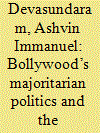

|
|
|
|
|
| Summary/Abstract |
India’s mainstream film industry has increasingly fallen under the influence of the Hindu nationalist ruling party and its agenda. But a thriving, multilingual independent sector is producing creative counternarratives.
|
|
|
|
|
|
|
|
|
|
|
|
|
|
|
|
| 8 |
ID:
095832
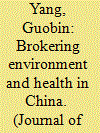

|
|
|
|
|
| Publication |
2010.
|
| Summary/Abstract |
This article identifies four types of issue entrepreneurs in the creation of public issues about the environment and health in China. They are media professionals, environmental and health NGOs, villagers, and netizens. Because of the different resources of issue entrepreneurs and the constraints of China's political context, politically safe and innocuous issues and issues of concern to the urban population are more likely to enter the public sphere. Contentious issues linked to the interests of powerful business and political actors may become publicized under extraordinary circumstances such as emergencies, disasters, or epidemics, suggesting that external shocks may have a galvanizing effect. Some environment-related health issues, such as pollution-related cancer, are high-stake issues. They often affect the most disadvantaged segments of the Chinese population, yet despite their gravity, their chances of entering the public sphere are small.
|
|
|
|
|
|
|
|
|
|
|
|
|
|
|
|
| 9 |
ID:
135007
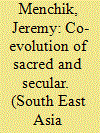

|
|
|
|
|
| Summary/Abstract |
While scholars of the Islamic revival have devoted attention to the increased prominence of Islamic law [the shari'a] in the once-secular public sphere, less attention has been paid to a countervailing trend. By mapping the evolution of Islamic law over the twentieth century, the author demonstrates that the shari'a is a product of decades of negotiations between Islamic institutions and more secular authorities including government ministers, doctors and social movements. This evolution suggests that secular authority and secular forms of knowledge have influenced but not displaced religious authority and religious forms of knowledge. The opposite is also true. This finding raises questions about the binary distinction between secular and sacred authority and suggests the co-evolution of religion and secularism in modern Muslim societies.
|
|
|
|
|
|
|
|
|
|
|
|
|
|
|
|
| 10 |
ID:
136288
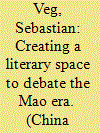

|
|
|
|
|
| Summary/Abstract |
Since the scar literature of the early 1980s, fiction and fictionalised autobiography have played an important role in bringing to light the mass violence of the Cultural Revolution. However, these texts remained within a well-defined framework in which the political system itself was not questioned. Over the last decade, by contrast, the Chinese literary field has focused more specifically on the 1950s, with works such as Yang Xianhui’s Chronicles of Jiabiangou (Tianjin, 2002), and Yang Jisheng’s Tombstone (Hong Kong, 2008). This paper focuses on Yan Lianke’s Four Books (Hong Kong, 2010), a full-fledged fictionalisation in a fantastic mode of the famine of the Great Leap Forward in a village on the Yellow River. Considering literature in the context of theories of the public sphere, it suggests that Yan’s book aims to broaden decisively the discussion on certain previously out-of-bounds aspects of the Mao era, an aim only partially thwarted by its failure to be published within mainland China. Four Books, like Yang Jisheng and Yang Xianhui’s works, thus represents an attempt to call into question the original legitimacy of the PRC polity and to create debate within the Chinese-speaking public sphere on the foundations of the current regime.
|
|
|
|
|
|
|
|
|
|
|
|
|
|
|
|
| 11 |
ID:
092007
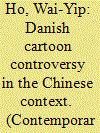

|
|
|
|
|
| Publication |
2009.
|
| Summary/Abstract |
Placed within the wider Chinese context of Muslims' reticent response to the publication of twelve cartoons by Danish newspaper Jyllands-Posten, this paper attempts to understand the transnational impact of global Muslim protests against the Danish Cartoons, which resulted in the re-emergence of Hong Kong Muslims in the public sphere. By discussing the genesis of the public appearance of Hong Kong Muslims in response to the Danish Cartoon affair, this paper argues that the controversy has resulted in a heightened sense of Islam in the Chinese public sphere. Framing the emerging Islamic voices in a context where the Chinese government has a coherent rationale towards religious policy in its domestic politics, and its unprecedented political experiement of One country, two systems, this article points out the contrasting public visibility and global connection of Muslims in Hong Kong and the Mainland.
|
|
|
|
|
|
|
|
|
|
|
|
|
|
|
|
| 12 |
ID:
091724
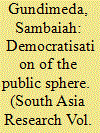

|
|
|
|
|
| Publication |
2009.
|
| Summary/Abstract |
Equality of treatment for all citizens and their cultures in public places is one of the prominent declarations of the secular Constitution of India. The hegemony of Hindu culture in the public sphere, however, reflects a dichotomy between stated declarations and social reality. Placing Dalits at the bottom of the caste hierarchy, if not outside it, 'mainstream' Hindu culture not only marginalised but importantly rejected the Dalits and their culture. This article examines the saga of the demand for a beef stall by the Dalit students in Hyderabad Central University and argues that the rejection of the culture of any community injures the human agency of that community. It is proposed that such injury can be healed only by a dialogical process, involving assertion of positivity and pride in the culture of the injured and positive recognition of such assertion by the injurer. Democratisation of the public sphere can be actualised by according representation to marginalised cultures, but in addition such representation needs to be accompanied with respect.
|
|
|
|
|
|
|
|
|
|
|
|
|
|
|
|
| 13 |
ID:
109595
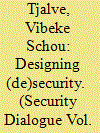

|
|
|
|
|
| Publication |
2011.
|
| Summary/Abstract |
This article pursues three interrelated objectives. Above all, it seeks to theorize desecuritization at the level of polity rather than policy; to distinguish between forms of political order and the likelihood that they will give in to the call for exceptional measures. Second, and to achieve that goal, it suggests a turn away from continental notions of 'the people' and towards American debates over 'the public sphere': a realm deliberately designed and continually cultivated to exercise autonomous, pluralistic and politicized contestation. Third, it examines why the 'speechlessness' of contemporary Western security practices may inhibit that public sphere from functioning properly.
|
|
|
|
|
|
|
|
|
|
|
|
|
|
|
|
| 14 |
ID:
137541
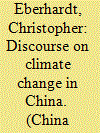

|
|
|
|
|
| Summary/Abstract |
In 2007 China passed the United States to become the greatest emitter of carbon dioxide (CO2). In the same year a report was published by the United Nations Intergovernmental Panel on Climate Change. Following this report, the Chinese media began to make a link between human activity and climate change. To analyse the climate discourse that has emerged since the publication of the report, this article draws on the argument of Guobin Yang and Craig Calhoun that China has a green public sphere. In China amid the messages to consume more are messages broadcast for the masses by the Chinese state and foreign non-governmental organizations (NGOs) advocating ‘green’ and ‘low-carbon’ lifestyles with little mention of climate change or questioning of existing policies. Smaller spaces or publics exist and are primarily occupied by governmental and non-governmental elites that debate and discuss climate change in serious and playful manners. Yet it is in spaces that are not public where policies are being crafted which influence the emissions of greenhouse gases in China, while citizens focus on their economic livelihood.
|
|
|
|
|
|
|
|
|
|
|
|
|
|
|
|
| 15 |
ID:
131248


|
|
|
|
|
| Publication |
2014.
|
| Summary/Abstract |
Recent scholarship in critical security studies argues that matter matters because it is not an inert backdrop to social life but lively, affectively laden, active in the constitution of subjects, and capable of enabling and constraining security practices and processes. This article seeks to further the debate about materiality and security. Its main claim is that materials-oriented approaches to security typically focus on the place of materials and objects within technologies and assemblages of governance. Less often do they ask how materials and objects become entangled in political controversies, and how objects mediate issues of public concern. To bring publics and contentious politics more fully into the debate about the matter of security, the article engages with Latour's work on politics, publics and things - or dingpolitik. It then connects the theme of dingpolitik to a particular controversy: Human Rights Watch's investigation of Gaza civilians allegedly killed by Israeli drone-launched missiles in 2008-2009. Drawing three lessons from this case, the article explores how further conversation between dingpolitik and security studies can be mutually beneficial for both literatures.
|
|
|
|
|
|
|
|
|
|
|
|
|
|
|
|
| 16 |
ID:
091964
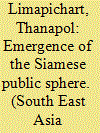

|
|
|
|
|
| Publication |
2009.
|
| Summary/Abstract |
The Siamese public sphere emerged in the second half of the nineteenth century from a series of historical events - the advent of print technology, the signing of new trade treaties and the agreements on extraterritoriality between Siam and several colonial powers, beginning with the British in 1855. This critical development generated a drastic transformation in Siam's mode of textual production, dissemination and consumption. Newspapers, journals and printed books were produced for the first time, and with them came new kinds of knowledge, forms of entertainment and spaces for discursive contestation. These changes inevitably challenged the Siamese ruling elite's ability to control political discourse and literary production, along with their essential cultural authority. Since these new spaces and practices could not be prohibited or closed down by traditional means of law and order such as the exercise of raw power, the Siamese elite responded to the challenges by resorting to various strategies: proclamations, financial subsidies to and buyouts of critical newspapers, the enactment of press laws and participating in the public sphere themselves. Members of the elite thus came to play the role of publishers as well as of political and literary critics. In this respect they became, however influential, only one discursive force among others in the new space.
|
|
|
|
|
|
|
|
|
|
|
|
|
|
|
|
| 17 |
ID:
143226
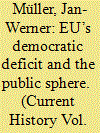

|
|
|
|
|
| Summary/Abstract |
The EU will not become something like a traditional nation-state anytime soon, and no supranational public sphere is likely to ever replace national public spheres.” Fifth in a series on public spheres around the world.
|
|
|
|
|
|
|
|
|
|
|
|
|
|
|
|
| 18 |
ID:
154551
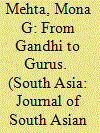

|
|
|
|
|
| Summary/Abstract |
This article compares the public sphere of gurus (‘guru-sphere’) in contemporary Gujarat and that of Gandhi historically as important sites of political contestation. It argues that despite their common use of religious idioms to convey political ideas, Gandhi and the gurus authorise radically different political projects with divergent conceptions of the Hindu subject and Indian polity. The discursive activities of the guru-sphere have helped forge a dominant consensus that endorses Hindutva politics. Operating within a democratic civil society and borrowing from Gandhian idioms, gurus have actively challenged key constitutional values derived from the Gandhian public sphere. The study reveals the paradoxical tendency of Gujarat's public sphere to produce hegemonic monologues over pluralistic dialogues, not in the absence of, but through the institutional mechanisms of, deliberative democracy.
|
|
|
|
|
|
|
|
|
|
|
|
|
|
|
|
| 19 |
ID:
119171


|
|
|
|
|
| Publication |
2013.
|
| Summary/Abstract |
The state implementation of Islamic law in the special autonomous region of Aceh (Indonesia) presents a complex and compelling case for examining some of the central themes of this special issue, particularly the attempt to understand the complex entanglements of secular nation states with contemporary religious movements. These dynamics are particularly energized in contemporary Aceh, where a state-directed project for the formal implementation of shari`a has been pursued alongside broader agendas for social reconstruction following the devastating 2004 tsunami and the subsequent end of decades of violent conflict between the 'Free Aceh Movement' (GAM) and the central Indonesian government. This article explores a heretofore un-examined source base - that of 'Text Messages (SMS) to the Editor' printed in a local newspaper - to gain new perspective on local debates over the role of Islam and official state structures in building a 'new Aceh'. This material presents a striking example of the complexity and contestation of popular discourses on Islamic law and society well beyond the realm of specialist spokesmen.
|
|
|
|
|
|
|
|
|
|
|
|
|
|
|
|
| 20 |
ID:
084859


|
|
|
|
|
|
|
|